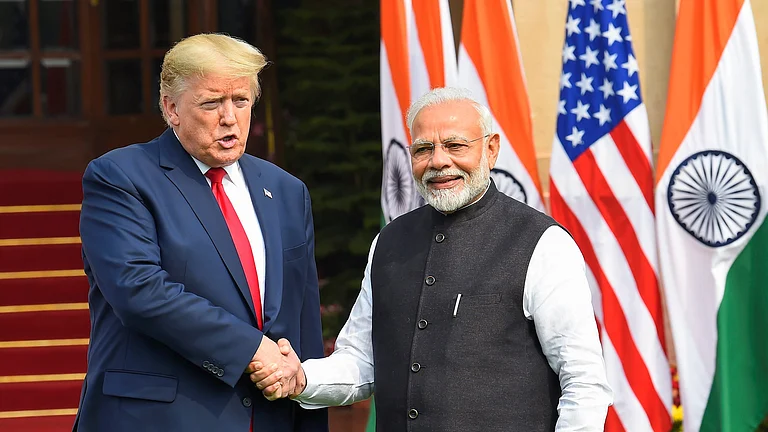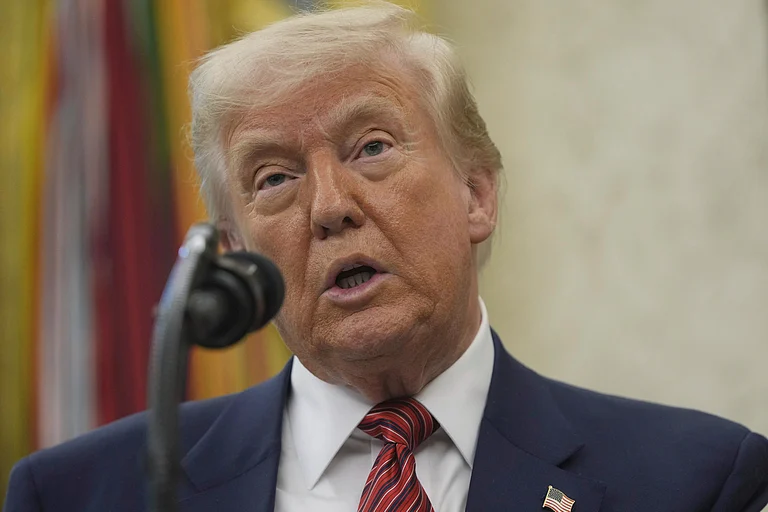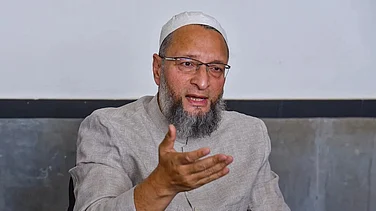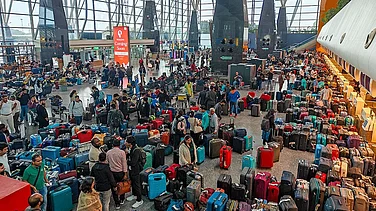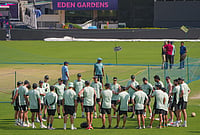
Summary of this article
India’s participation in 25th SCO meeting underscores push for economic-first approach.
New Delhi faces difficult task, but its foreign policy must 'Act East' through concrete actions.
Crucial to project a resilient economic identity, not overshadowed by the Trump's rhetoric.
High-level visits by External Affairs Minister S. Jaishankar to China after six years and meeting the President of China Xi Jinping, and also Foreign Minister Wang Yi, who is visiting India next week to meet National Security Advisor Ajit Doval, indicate a Trump effect percolating into New Delhi’s foreign policy-making edifice. Why this hullabaloo and will the prime minister’s impending visit to Tianjin help? Maybe.
The 25th Shanghai Cooperation Organization (SCO) meeting in Tianjin, China—from August 31 to September 1—will be the cynosure of many countries, strategic analysts cornucopia and consultants fixated on economic opportunities, if any. Tianjin Port on Bohai Bay exemplifies the economic transformation of China since the reform phase of 1979, epitomising the official closure of the Mao era and the reversion to civilisational continuity of commercial activities. Leaders of China, India and Russia at the 10-member SCO meeting will be watched closely for their coming together to discuss comprehensive issues—needlessly complicated by irreverent statements made by US President Donald Trump.
An epoch growingly determined by technological capabilities, especially digital economic dominance in all spectrums of tangible aspects, could be the emphasis of renewed neo-geopolitics evolving into geoeconomics as the primary concern supplanting the Westphalian rubric, dominating international relation discourses. Russia, China and India are on the Mercator map, a large geographical realm stretching from the freezing Arctic to the warm Indian Ocean. When the three leaders meet at the SCO, a packed agenda of issues awaits—opinions, positions and alternatives to be adopted and preserve their respective sovereignty with identity, encountering ballistic hectoring for their hegemony. Really?
To begin with, much has changed in China, the host. Decision-making of economic China begins here in contemporary terms. The ‘Four Modernisations’, articulated first by Zhou Enlai in 1965, are perceptible in Tianjin. Looking beyond the political and strategic, for the three countries, continuity of economics as ballast is there, despite the aberrations of the political exploits during the first three decades of China’s ideological adventurism. Much internal reorientation has taken place, which in a short span of a little over four-and-a-half-decades, has transformed the way the rest of the world interacts with China, and the way China reciprocates. As civilisations, China, India and Russia must be coordinating responses to be adopted to safeguard their respective economies from any travails consequent to inexplicable tariff barriers, imposed by Trump, taking effect.
To China, the Chinese phrase zhong xue wei ti, xi xue wei yong [Chinese learning for essence; western learning for use] has been continuum, exemplified by China’s behavioural traits since 1949. The Chinese ti-yong debate treats the universal laws of globalisation as ‘essence’ (ti), and Chinese characteristics as ‘function’ (yong) leading to a balanced perspective. If one were to take a macro perspective, the conflict between “total repudiation” and “total westernisation” continues—with Chinese culture as ‘essence’ and western technology as ‘learning’ or to say, in other words, preferring to retain traditional values relying on Western technology to create a modern economy, and society having been filtered as conventional wisdom. In its contemporary dimensions, this debate can be interpreted as ‘socialism with Chinese characteristics’.
In accepting the economic West, Chinese leaders have always seemed inclined to seek a new economic order that is thoroughly modern, yet distinctly Chinese. A sense of historic continuity emerges here, if one were to interpret Sun Yat-sen’s ‘Three Principles of the People’ as a forerunner of socialist tenets. Yes, Xi Jinping at helm of the Communist Party of China (CPC), would scoff, but not rebuke what the founder of the Kuomintang (KMT) had said and written. The continuum mentioned earlier was when after Mao’s time, Deng Xiaoping said, “[I]n general, we believed that the course we have chosen, which we call building socialism with Chinese characteristics, is the right one,” opening his own chapter in China’s century-long debate about how to maintain economic traction and recover from defeats to foreigners with parcels of land taken away.
To China, the essence of capitalism is private ownership, a free market economic system, and the distribution of wealth in accordance to the capital earned. As a politician, Xi Jinping has to preside over creating higher productive forces, to get rid of socio-economic inequalities, destroy urban shortcomings, and enable members of society to prosper—that’s what China’s centralised polity aspires to. The pandemic years (2019-2022) left China with domestic economic crises, still persistent. To Xi Jinping, the SCO meeting in Tianjin will be the continued enunciation of a logical decision-making policy outcome to the SCO multilateral and not unilateral shenanigans. The shift in the overall strategy is for the country to become a comprehensive digital economic exemplar as a chief national objective. A foreign policy that stresses and prioritises economic content in its relations with other countries with investment is the template.
Russia, at the SCO, reflects discomfort with the economic and strategic restrictions placed largely by occidental institutions by invoking war spreading scares. Wilful quarantining of Russia by advanced economic powers, with rhetoric over war in Ukraine is to Moscow the wilful ignorance behind which are the powerful stimulants of corporate greed with malign encouragement from the self-declared world’s oldest democracy! To Russia, this is a continuation of efforts to break up Russia for financial gains masquerading as promotion of freedom, liberty and justice, nouns beginning to sound hollow to those advocating them! These to Moscow illustrate a divisive instinct prevailing in advanced economies where Russia, with its immense natural resources, is typified as anathema to material values espoused to globalisation enunciated, defined and regulated by western countries.
The SCO meeting is a forum where polite concerns over Ukraine will be made behind closed doors, little else. To Russia, Ukraine, especially Kiev, is essential to its historical civilisational continuum. The Eastern Orthodox Church in Moscow since 1325 was earlier in Kiev, central to Kievan Rus. After more than three centuries, in 1686, the Ecumenical Patriarch of Constantinople shifted the Metropolitan of Kiev to the Patriarch of Moscow. A deeply ingrained civilisational religiosity minus its extreme interpretations pervades Russia’s political firmament irrespective of ideological bases. To Moscow, the hypocrisy of the West is seen in Ukraine being the recipient of defence materiel from countries professing peace to be at all times while ignoring atrocities elsewhere—Gaza, Sudan and Myanmar, for instance. This meeting of the SCO will illustrate how the prime economic power—the US—is discomfited at facing the prospect of becoming the second-largest economic power within a decade after China. To Putin, the reaffirmation of deepening ties with China ensures that the Russian economy will not face negative value features owing to Trump’s “irrational exuberance” and hunger to acquire immense natural resources of Russia by fomenting regional schisms and desiring the parcelling of large geographical identities into statelets abiding by ‘guidance’ from far away!
As a target of higher tariffs imposed by the US, India’s presence at the SCO this year with Prime Minister Narendra Modi, is an announcement of staying the multilateral course and not be described as oscillating towards the ‘unipolar’ power. Comprising the world’s largest population, the SCO of 2025 is the voice of three billion people (China and Russia included) wanting to be in control of their respective economic agendas, without any unsound pontifications from ‘elsewhere’. A sequestration of economic from politico-strategic is required. New Delhi, Beijing and Moscow will be more comfortable trading with one another by establishing linkages in diverse economic spectrums. If the three largest economies of Eurasia agree to begin talks for a common currency exclusively to trade, it would take forward the BRICS proposal for an alternative to the US dollar, a currency the Bretton Woods twins had recommended to be the template when international monetary conversion of market values are done.
This anchoring to the US dollar ended in 1971, though continuing as a reference point, requiring much-needed correction. Trump opposes this, and has said that he would end BRICS! Can the SCO 2025 work towards making economic agenda commensurate that will make the Eurasia realm from intemperate hectoring, with the politico-strategic as the only determinant? Economic ballast is to be the primary determinant with respective domestic milieus in synchrony with aspirations enthusing and not dictated.
India could be a primary template to offer financial services to a foreseeable commonality in trade values with domestic currency estimations made flexible by an accepted financial values arbiter. Mumbai, being Asia’s oldest stock market (1875), could be the place where trade-related financial dynamism, flexibility in monetising and raising resources must be considered. Economics needs to prevail over politics despite polemical tempests articulated through officialese. Here, India has to deftly convince the 10 members to issue a statement condemning terrorism in all forms. Objections will be raised by Pakistan, as a member of this inter-governmental forum, which should not derail our geo-economic agenda and separating geo-political from the need for more intense collaboration, enhancing group economic identity by not discriminating members like Iran. A tough call is to be made yet, India’s foreign policy has to Act East with deeds beyond words exemplifying an economic personality not circumscribed by regular provoking utterances of Trump. The SCO meeting has to convey very subtly, its presence and functioning as the Eurasian market is 10 times larger than those stuck in the past.
(Views expressed are personal)
MORE FROM THIS ISSUE
This article appeared in Outlook Magazine's 01 September 2025 issue, The Tariff Weapon, as The Silk Route Beckons.
Raviprasad Narayanan is an academic focusing on international relations with China and Taiwan as domain in writings and teaching



